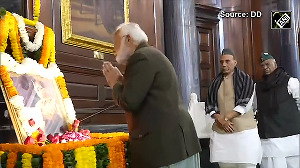Samajwadi Party patriarch Mulayam Singh Yadav, who passed away on Monday, and Nationalist Congress Party chief Sharad Pawar formed the unlikely duo who set in motion political events in 1999 that dashed Congress president Sonia Gandhi's prime ministerial hopes.

Gandhi, then a newly appointed Congress chief, had staked claim to form the government at the Centre after the then Prime Minister Atal Bihari Vajpayee had lost the vote of confidence in the Lok Sabha on April 17, 1999.
"We have 272 and we hope to get more, we are confident we will get more," Gandhi had famously told reporters at the Rashtrapati Bhawan after calling on the then President K R Narayanan.
However, Yadav, whose 20 members in the Lok Sabha were crucial for the Congress to cross the majority mark, had different plans and was not keen to back Gandhi as the prime minister.
Yadav had proposed the name of Communist Party of India-Marxist stalwart Jyoti Basu for the top executive post, bristling at Gandhi's claims of forming a Congress government to replace the Vajypayee-led National Democratic Alliance.
"We should all get together and decide who should be the leader in New Delhi," Yadav had then said and demanded a share in power.
Nearly a month later, Sharad Pawar, then the Leader of the Congress in the Lok Sabha, had raised the matter of Gandhi's foreign origin and pointed out that the Congress had not been able to counter the Bharatiya Janata Party, which was making it an election issue.
The rebellion in the Congress ranks unfolded at a meeting of the Congress Working Committee on May 15, 1999, barely a month after Yadav had dealt a blow to Gandhi's prime ministerial hopes.
Though Gandhi had not clearly spelt out that she was in the reckoning for the post of prime minister, many Congress leaders were keen to see her in the top executive post.
The BJP had won 182 seats in the 1998 Lok Sabha elections, 57 of which were in Uttar Pradesh alone, while Congress had emerged victorious in 141 parliamentary constituencies, but drawn a blank in the country's biggest state.
Yadav's refusal to back Gandhi in 1999 came as a shock as a prospective central government would not have had any representation in the country's most populous state.
The second shocker came with Pawar's rebellion, dashing hopes of the Congress in Maharashtra, the second largest state in terms of the number of representatives (48) it sent to the Lok Sabha.
In 1998, Congress had won 33 seats in Maharashtra.
While Pawar succeeded in striking friendships across the political spectrum and joined hands with the Congress, months after his rebellion, to form the government in Maharashtra, Yadav was not that successful on this front.
Pawar also enjoyed a share in power as Agriculture Minister in the Congress-led United Progressive Alliance (UPA) government.
Though the Congress supported Yadav in forming the government in Uttar Pradesh later, the SP was never a part of the UPA government led by Prime Minister Manmohan Singh from 2004 to 2014.
Sonia Gandhi on Monday said the voice of socialist ideas has fallen silent with the demise of Yadav.
As the defence minister of the country and the chief minister of Uttar Pradesh, the contribution of Yadav will remain unforgettable, Gandhi said in her message.
"More than that, his struggle for the oppressed and downtrodden will always be remembered," she said.
Whenever there was a need to protect the constitutional values of the country, the Congress has always got his support, she added.
Pawar said Yadav gave a strong ideology to Samajwadi Party to stand strong against communal forces and worked towards creating a socialist society.











 © 2025
© 2025